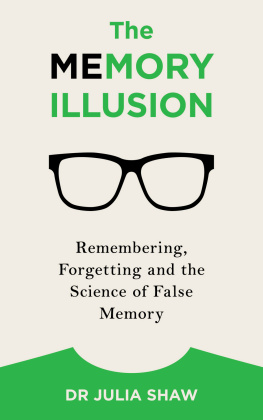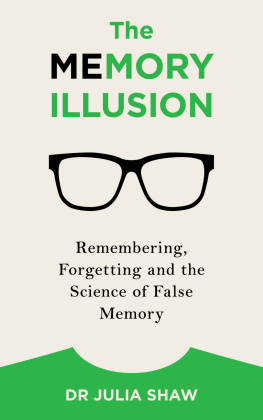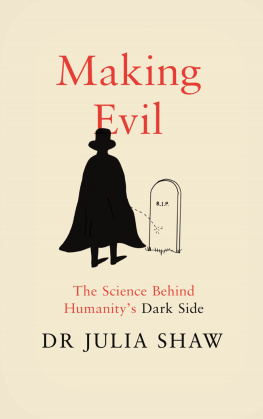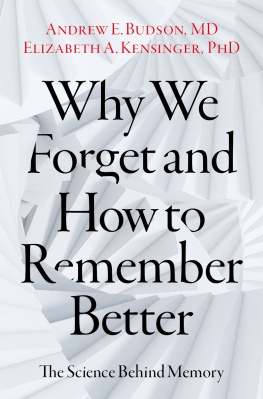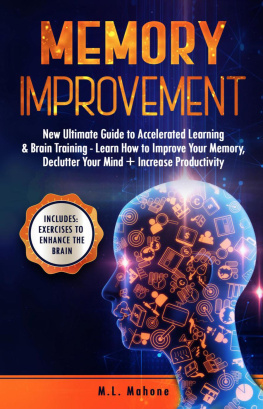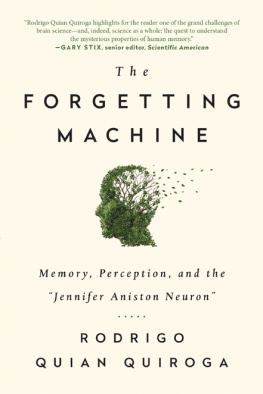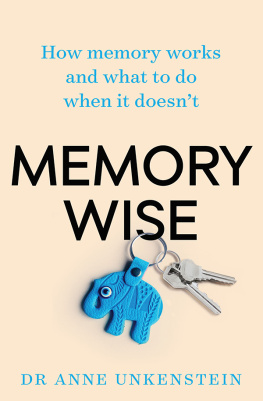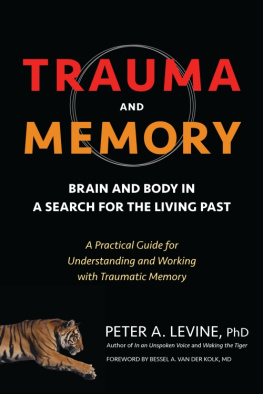Contents
About the Author
Dr Julia Shaw is a senior lecturer and researcher in the Department of Law and Social Sciences at London South Bank University, and is one of only a handful of experts in the world who conduct research on complex memory errors related to emotional personal events so-called rich false memories.
Dr Shaw has published research articles in various international academic journals, has written textbook chapters, is a regular contributor to the popular science magazine Scientific American, and gives guest lectures and conference presentations around the world. She also teaches classes at undergraduate and graduate level, for which she has won two teaching excellence awards.
Besides her teaching and research, she has delivered general business and police-training workshops, has evaluated offender diversion programs, and works with the UK police to advise on historical sexual and physical abuse cases. She has also been featured as an expert on TV, radio, and in UK and international newspapers.
About the Book
Think you have a good memory? Think again.
Memories are our most cherished possessions. We rely on them every day of our lives. They make us who we are. And yet the truth is they are far from being the accurate record of the past we like to think they are. True, we can all admit to having suffered occasional memory lapses, such as entering a room and immediately forgetting why, or suddenly being unable to recall the name of someone weve met dozens of times. But what if our minds have the potential for more profound errors, that enable the manipulation or even outright fabrication of our memories?
In The Memory Illusion, forensic psychologist and memory expert Dr Julia Shaw uses the latest research to show the astonishing variety of ways in which our brains can indeed be led astray. She shows why we can sometimes misappropriate other peoples memories, subsequently believing them to be our own. She explains how police officers can imprison an innocent man for life on the basis of many denials and just one confession. She demonstrates the way radically false memories can be deliberately implanted, leading people to believe they had tea with Prince Charles, or committed crimes that never happened. And she reveals how, in spite of all this, we can improve our memory through simple awareness of its fallibility.
Fascinating and unnerving in equal measure, The Memory Illusion offers a unique insight into the human brain, challenging you to question how much you can ever truly know about yourself.
THE MEMORY ILLUSION
Remembering, Forgetting, and the Science of False Memory
DR JULIA SHAW

To Fred.
Our memories are constructive. Theyre reconstructive. Memory works like a Wikipedia page: you can go in there and change it, but so can other people.
Professor Elizabeth Loftus
Introduction
Nobel Laureates, on receiving their prize, get the equivalent of a Twitter post explaining what the award is for. Since I learned this, I have spent what is probably far too much time reviewing these -characters-or-fewer statements written to describe the profound impact laureates have had on the world.
One of my all-time favourites summarises the work of Seamus Heaney, who won the 1995 Nobel Prize in literature. It explains that he received the award for creating works of lyrical beauty and ethical depth, which exalt everyday miracles and the living past. What an incredible statement. Beauty, ethics and history, drenched with a sense of wonder and captured in just a few words. Every time I read that phrase I smile.
I write these laureate summaries on the little whiteboard I have on my desk as inspiration. I also use them in my lectures, and I try to weave them into my writing. They represent the notion that even humanitys greatest achievements can be explained in plain English. This is an idea that has been echoed by many of historys greats; that for our work to carry significance, we must be able to explain it simply.
I live by this philosophy of explanatory parsimony myself, though of course it does sometimes come at the cost of explanatory adequacy. In other words, when I explain concepts by using analogies, stories or simplifications, I always risk losing some of the nuances of the inherently complex issues under discussion. The subjects I will be examining here, memory and identity, are both incredibly complex, and in a single book I can only hope to scratch the surface of the incredible research being done at the intersection of those areas. But while I cannot promise to capture the whole scientific picture, I do hope to begin a questioning process, one which addresses fundamental queries that have likely been nagging at most of us ever since we first began to utilise the gift of introspection.
Like many others, I first noticed my ability to introspect when I was a child. I remember lying awake for hours as a little girl, unable to fall asleep because I was so engrossed in thought. Lying on the top bunk of my bed I would press the soles of my feet against the white ceiling of my room and reflect on the meaning of life. Who am I? What am I? What is real? While I did not know it at the time, this was when I began to become a psychologist. Those questions are about the core aspects of what it means to be human. As a little girl I had no idea that I was in such good company when I could not figure out the answers.
While I no longer have the bunk bed, I do still have the questions. Instead of philosophising to my ceiling I now conduct research. Instead of discussing who I am with my musical bear, I get to discuss it with fellow scientists, students, and others who are curious like me. So, let us start our adventure through the world of memory at the beginning of all beginnings, where re-search is me-search. Lets ask: What makes you, you?
You-ness
When we define ourselves we may think about our gender, ethnicity, age, occupation and the markers of adulthood we have achieved, such as completing our education, buying a house, getting married, having children or reaching retirement. We may also think about personality characteristics whether we tend to be optimistic or pessimistic, funny or serious, selfish or selfless. On top of this we likely think about how we compare to others, often directly monitoring how our Facebook friends and LinkedIn connections are doing to see whether we are keeping up. However, while all of these descriptors may be more or less appropriate ways of defining who you are, the true root of your you-ness almost certainly lies in your personal memories.
Our personal memories help us understand our life trajectories. It is only through my personal memories that I can recall the chats I had with one of my most inspiring undergraduate professors, Dr Barry Beyerstein, who taught me critical thinking and often shared lemon poppy-seed loaves with me. Or the talks after lectures with Dr Stephen Hart, who was the first person in my life to encourage me to go to graduate school. Or my moms serious car accident a few years back, which taught me the importance of expressing my emotions to the people I love. Such milestone interactions carry tremendous significant for us, and help us organise our personal narrative. More generally, memories form the bedrock of our identities. They shape what we think we have experienced and, as such, what we believe we are capable of in the future. Because of all this, if we begin to call our memory into question we are also forced to question the very foundations of who we are.
Next page
